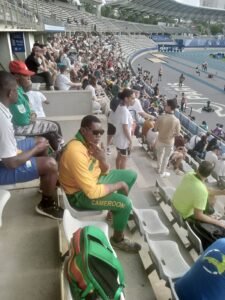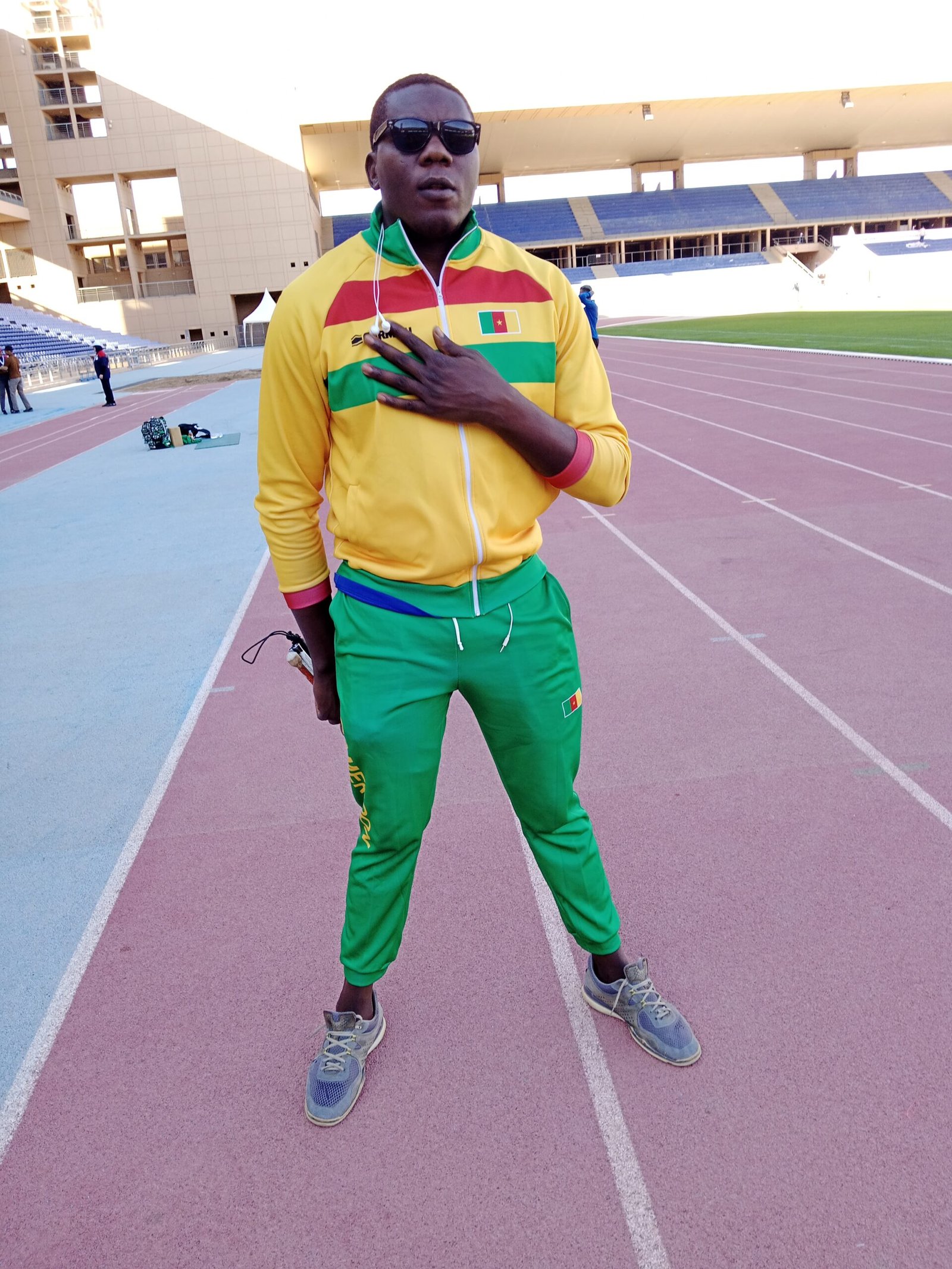By Kesah Princely, Cameroon.
Sports for the disabled though not a lucrative industry in Africa, Clement Yuh Ndim, 28, certainly knows what he does to burn out negative societal energy not only towards those blind like him but the disability community in general.
Clement hails from Foundong district, a locality in Cameroon’s Northwest region.
Though not an investor, Clement is an incredible athlete using sports to advance the struggle for disability inclusion.
Persons with disabilities in Cameroon face discrimination and exclusion in almost every aspect of everyday life , a long standing problem which the sport man is seeking to address.
From physical to altitudinal, the barriers to inclusion in the country suggest that Clement has a huge mountain to level, but how this can be possible using sport is a difficult equation which only him has been able to attempt.
Sighted for the first 21 years of his life, the now disability inclusion crusader enjoyed football, playing both as goal keeper and midfielder. In fact, those still reminiscent of Clement’s football days often describe him as a carbon copy of Cameroon’s sensational ball playing goal keeper, Andre Onana who also plies his trade with English football powerhouse, Manchester United FC.
While growing up and schooling, Clement participated in several tournaments with the most memorable being national university games where he took charge of the University of Bamenda’s goalkeeping department.
At the prime of what seemed like a blistering career in football, the ball playing goalkeeper unexpectedly lost his sight on Christmas morning in 2017.
“It was extremely a difficult task to accept my new state as a blind person and sit home,” he said.
This was however meant to be the bitter reality which Clement had to face after he took ill and later had a complete dark out.
To him, his entire world had crumbled and the only difference with a corpse was that he at least, could still breathe.
Now a blind person, Clement faced much exclusion and for the first time, he experienced firsthand what it meant to live a blind person in Cameroon. What he went through in the early days of his visual impairment soon became his motivation which he now uses to champion disability inclusion.
“I thought being blind was the end of the road for me. I did not know I could still ever kick a ball,” he sorrowfully told DNA.
New life for Clement.
How the young promisingly looking football star found light within the first two years of his visual impairment all seemed a mystery.
It had become clear to him that he would not be sighted again, prompting him to accept his situation amidst physical and altitudinal barriers.
“The best treatment I had was pity and constant reminders that I could never be independent and economically viable again as a blind person,” he sadly revealed.
In the midst of the hard times, he enrolled in a school for the blind in Buea, capital city of Cameroon’s Southwest region where he hoped to learn the writing and reading of Braille, a writing widely used by blind people around the world.
As if the world’s troubles now rest on him, the Corona virus hit Cameroon, resulting in the closure of activities including the Rehabilitation Institute for the Blind, the school he attended.
Again, Clement felt discouraged in his new journey but would not back paddle thanks to advice from other visually impaired friends who shared in his pain.
“They told me I could also be like them despite only losing my side two years earlier. They taught me that blindness was rather a sweet than a bitter experience,” he revealed hopefully.
One of those who were at the heart of encouraging Clement was Peter Tornain, president of Hope Social Union for the Visually Impaired, an organisation for the blind and partially sighted in Bamenda, chief city of the country’s Northwest region.
Only learning Braille was not enough to push Clement to where he dreamt to be. So, he returned to his former University where he trained as a history teacher.
This was never going to still really bring him much fulfilment so long as sport was not involved.
It was until he listened to a paralypic slot on BBC radio in 2021 that he once felt revitalised. The radio program was centred on the Paralypic games holding in Japan that year.
For the first time since losing his sight, Clement discovered that blind people too could be good athletes. The BBC program provided answers to questions he had asked himself since losing his sight.
He would go on to distinguish and establish himself as an elite athlete championing disability inclusion through sports.

A new dawn for Clement
Now conscious that being blind did not ever preclude him from excelling in his much loved sports, Clement joined the Hope Social Union for the Visually Impaired, HSUVI where he became the king pin of the association’s goal ball team.
HSUVI is an organisation of the blind and partially sighted militating for disability inclusion in Cameroon.
Clement soon became an icon, shining not only for himself, he now occupies a front seat in a journey to redirect the course of disability inclusion in Cameroon through adapted sports for the blind.
The 1.87 metre tall and energetic athlete does not only thrive in Goal Ball, but also a celebrated crowd pulling Short Putter, Discus and Javelin thrower.
He took part in the Grand Pre-Marrakech, a tournament in Morocco earlier in 2023 where he harvested both gold and silver medals, ensuring he sealed his place at the Paris World championship.
Fans love the zeal and tenacity with which the 28-year-old athlete performs each time he is called to duty.
This is the niche Clement has calved out for a campaign which is now seen as a catalyst for disability inclusion in Cameroon, and he is not alone in the action. Blind ladies too now join him to showcase the ability in disability through adapted sports.
A society filled with a lot of negative energy towards especially women with disabilities requires that robust advocacy be carried out on several fronts to burn out such exclusionary feelings.
This is what motivated Louisa Akouma, 25, to join Clement’s course for disability inclusion through sports.
Growing up in her Kumbo community, Bui division of the Northwest region, Louisa realised she had to be a devoted fighter to be treated with empathy and love opposed to pity and exclusion.
She would not even have someone to play with while growing up only because she couldn’t see. It felt to her as though her mates feared being infected with blindness, and this kept her thinking all through out her elementary and college education.
However, meeting Clement while in the University of Bamenda where Louisa currently studies English language has been an experience never to forget.
“Clement has turned my struggle around to see beyond just myself but to be a true representative of persons with disabilities,” she delightfully told DNA.
There are not many ladies with visual impairment who have the courage to participate in sporting activities, leaving Louisa in some tight corner.
“I am proudly playing in the same goal ball team with men because my fellow blind women shy away from the art,” she said.
To her, competing with men gives her extra fulfilment and portraying the power and skills of the disabled woman.
Louisa’s mentor, Clement described her as a courageous woman who dreams to fight for a more disability conscious environment for the disability community in Cameroon.
But participation without remunerations for Louisa and Clement could be so discouraging for their course.
They love the art but limited competitions and lack of sponsorship constitute a huge barrier.
Rose Yina, physical trainer of visually impaired adapted sports with 15 years of experience says only passion has kept the athletes moving.
Citing challenges such as lack of sponsors, limited training materials, poor training grounds, lack of volunteers and limited local competitions, Rose revealed to DNA that athletes in Bamenda living amidst a raging armed conflict only exacerbates an already bad situation.
She insists there is hope for adapted sports for the blind but such a dream would only be realised if community leaders throw their weight behind the struggling athletes and limited coaches.
“I sometimes work with 10 athletes alone without any volunteers because people still don’t see how and why blind people should be involved in sports. I am glad such negative perceptions are gradually diminishing thanks to the hard work of our athletes but we in Bamenda truly deserve better,” she intimated.
After much advocacy, the administration of Bamenda III district has become the first municipal council area to include youth with visual impairment in their annual sporting activities and Rose and her athlete hope others can emulate such exercise of sport inclusion around the Northwest region and beyond.
While hoping to accelerate their disability inclusion campaign in the days ahead, Clement and Louisa look forward to see more support for adapted sports for the blind in Cameroon and beyond.
They too are athletes like their nondisabled peers and deserve to be treated humanely.
